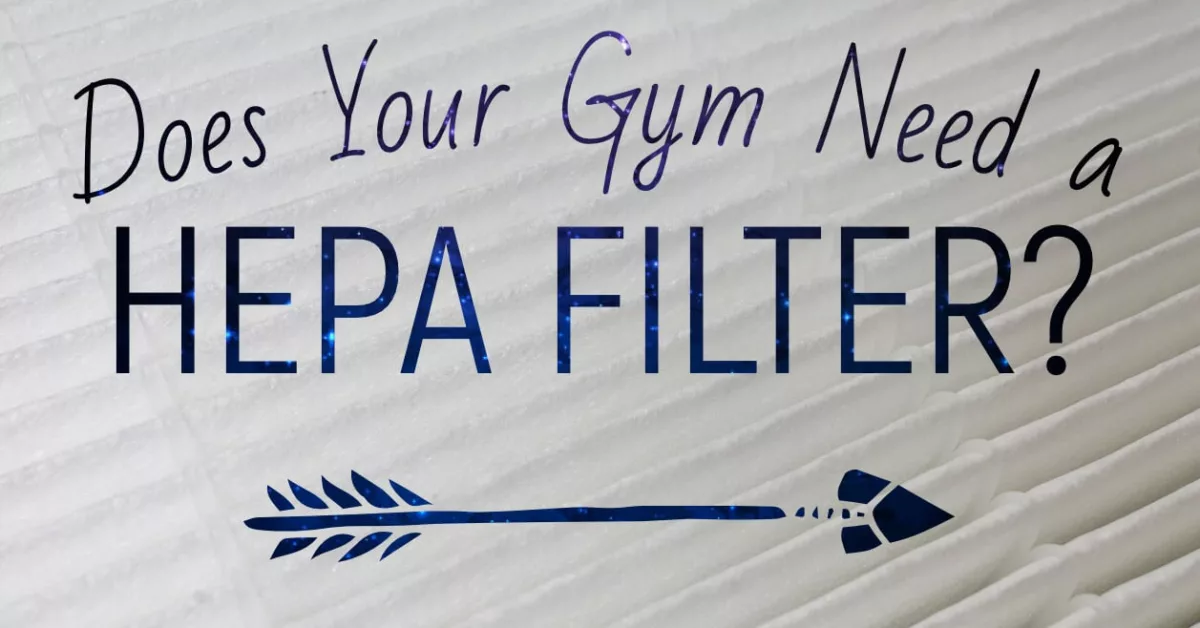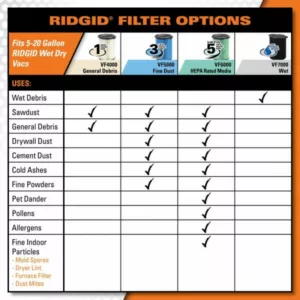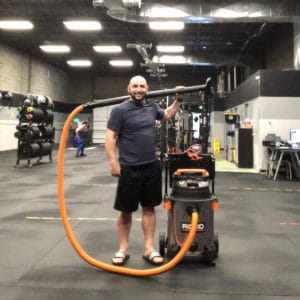Do you know what kind of filter your gym uses when they vacuum? I’m sure you hope it’s a HEPA filter, but did you even ask? Do you even really know what a HEPA filter is? Does it really make a difference? I boiled down the science, cut through the marketing hype, and assembled an essential overview of the HEPA filter for gyms. We cover what HEPA Filters are, How they Work, and the Threshold Question, “Does your Gym Really Need One?”
HEPA Filters can capture 99.97% of particles .3 microns are larger. While HEPA filters can be made of different materials, what defines a HEPA filter is the particle size that it can capture. The HEPA filters in our vacuums feature a 5 layer filter to capture increasing smaller particle sizes like a sieve. With a standard one layer filter, your vacuum will pick up large stuff like dirt and chalk, But it’s the smaller particles like bacteria, dust, pollen, mold, and skin cells that can bypass a standard 1 layer or 3 layer filter.
What make a HEPA filter super important is that a vacuum has a high speed exhaust. Anything not trapped by the filter will get tossed back into the air. Do you see where I am going? Yes, all the microscopic bacteria, skin cells, pollens, and fungus on your gym floor will be tossed back up into air after your personal trainer finishes vacuuming. COVID-19 concerns aside, do you really want to breathe that crap into lungs when you are trying to exercise?
Have you asked your gym what kind of vacuum filters they use? Personally, I’d be too embarrassed to ask, because I wouldn’t feel that I had the power to change what my gym does. And let’s be honest, do you really think your personal trainer actually knows what kind of filters the gym buys? HEPA filters are very expensive and clog more quickly, so you also know that a commercial cleaning company isn’t going to use them either.
It’s too bad that you can’t specify a Membership with a HEPA Filter Upgrade. Well actually you can — you can choose which gym you go to. When you break down the decision you really have two choices. You can go to a large franchise gym or you can go to a private gym.
Large franchise gyms — you know, the ones in the fancy shopping centers that make their money off members who don’t even go to the gym — have shareholders that are focused making more money. Their shareholder meetings are about lowering cost per member, reducing total costs, and maximizing growth rates. These gyms with their shareholders are focused on thing and one thing alone … how to make as much money per member as possible. If you don’t believe me, just look at the news. Every other large gym is filing bankruptcy and restructuring debts. That’s where there focus is — cutting corners everywhere that you can’t see. So you can guess what kind of cheap single layer paper filters are in their vacuums. Most of these gyms don’t even care about the health of their employees, let alone their members. As you long as you keep paying, and preferably, not coming.
Privately-owned small business where the owners care about your health and workout in the same gym as you. A gym that has installed PM25 sensors (these measure particles in the air) so you can see how clean the air is. And even if you can’t choose Sand & Steel, because you live too far away, you can find a locally owned gym with owners that care about your safety. Look for one.
It’s Your Health — You Want Gyms to Change?
Choose a Gym that Cares About Its People More Than Its Profits
But whatever… it’s a filter right? What’s the big deal? Think about it … that vacuum passes over the entire floor every day. It just recirculates the small particles (like fungus and bacteria) back into the air. To be honest, I didn’t know that much about vacuum bag technology, when I opened Sand and Steel. So I did what every good nerd should do, and researched it. I researched the patents on HEPA filter, the certification process (most “HEPA” bags aren’t certified by Hepacart), and even the origin of the HEPA filer. Turns out HEPA filters were developed during the Manhattan Project to contain the spread of airborne radioactive contaminants — who knew?
I also learned that most commercial vacuums on the market don’t have a HEPA filter. They are much more expensive and they don’t last nearly as long as a standard 1-layer filter. Most consumers want a bagless vacuum for convenience, and they don’t want to replace a filter every 3 months. When was the last time you replaced your vacuum filter? Do you think your coach at Globo Gym #5 looked into replacing their vacuum filter? Worse still, many commercially sold HEPA filters aren’t independently certified. I don’t know about you, but my trust in large companies to meet safety standards without independent certification is close to zero.
Fact. Hepacart HEPA filters are independently certified to capture 99.97 percent of fine airborne particles larger than at least 0.3 microns in size. HEPA filters are effective at eliminating viruses, bacteria, airborne fungi, pollen, human hair, and particulate matter (such as smoke particles, pet dander, and dust). HEPA filters are commercially used on aircraft and hospitals to restrict the spread of airborne fungi, viruses, and bacteria.
Fact. Most standard vacuums just don’t have the horsepower to maintain a strong enough suction level with substantially reduced airflow that a HEPA filter causes. It’s not complicated … a smaller, finer mesh reduces vacuum pressure. Good thing I didn’t buy a regular vacuum. 🙂


